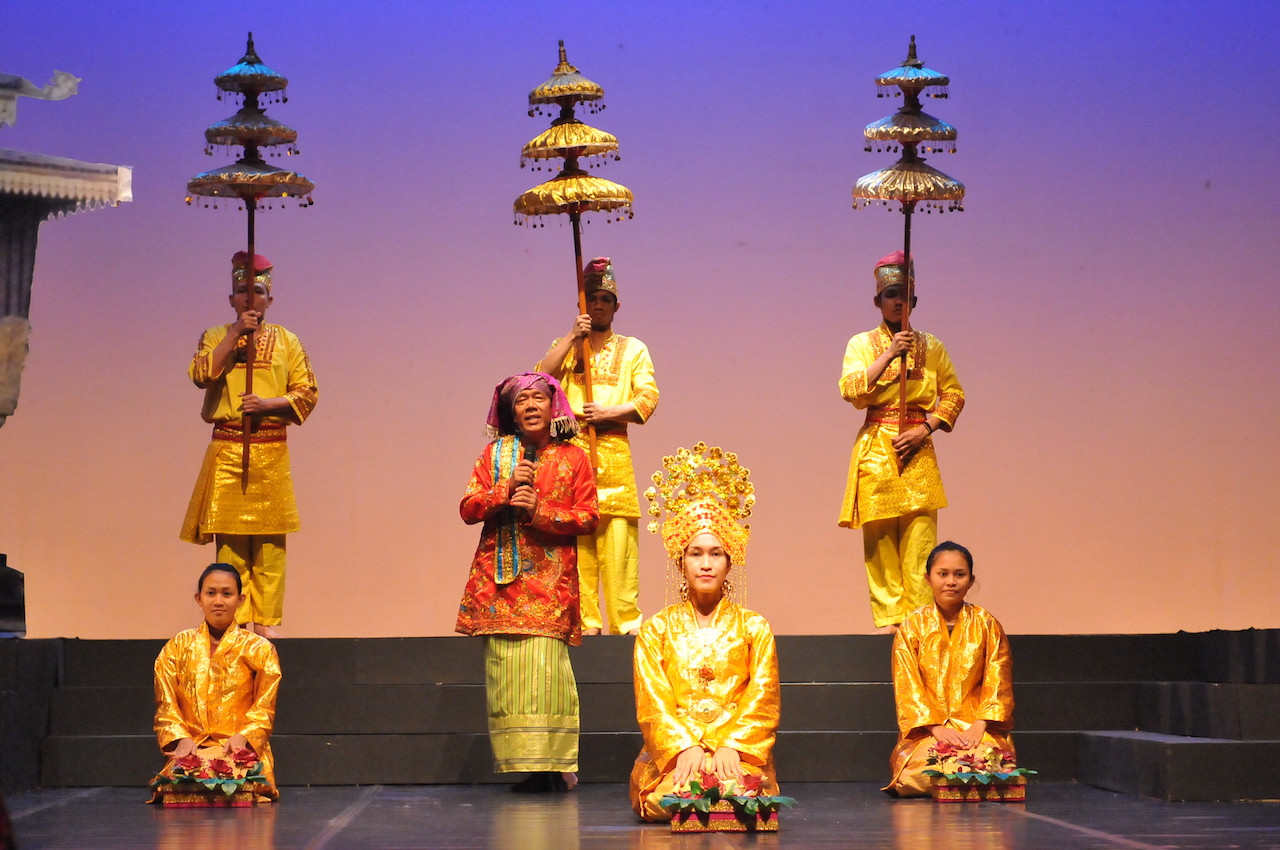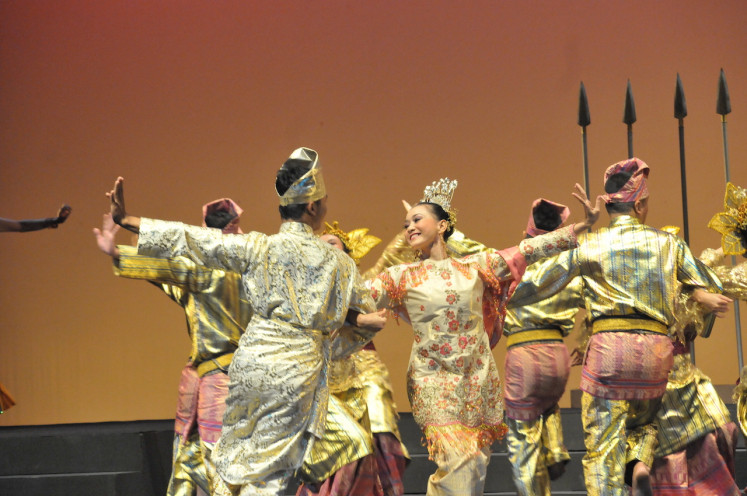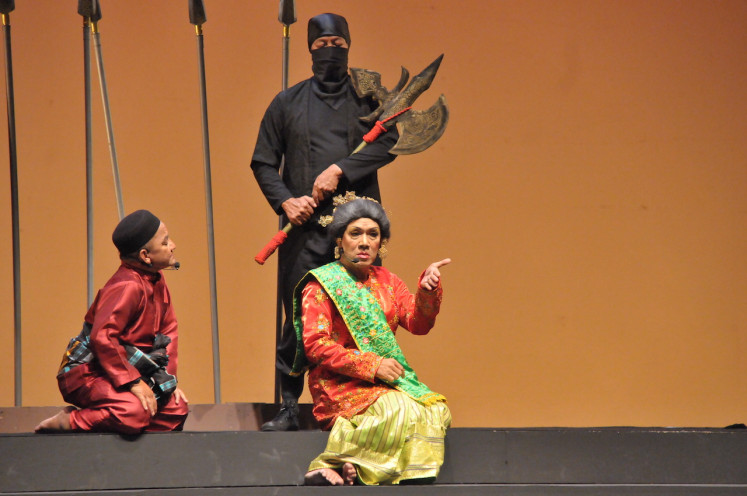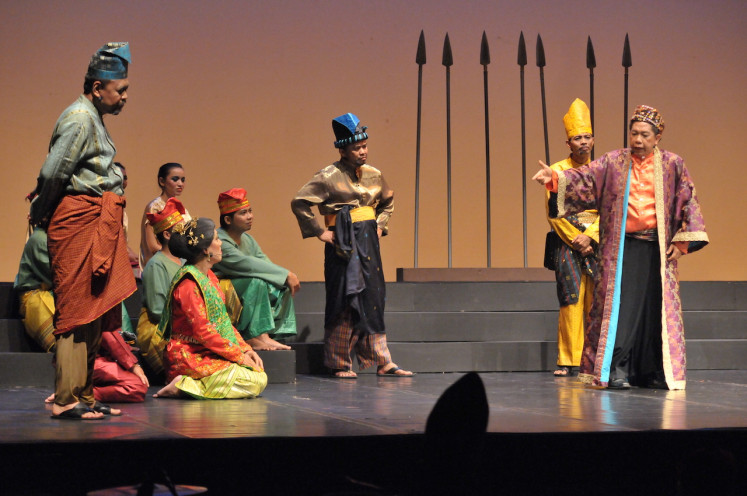Popular Reads
Top Results
Can't find what you're looking for?
View all search resultsPopular Reads
Top Results
Can't find what you're looking for?
View all search results‘Mak Jogi’: A tale of Melayu cultural diplomacy
Change text size
Gift Premium Articles
to Anyone
Another week, another performance to enjoy at home to avoid worrying about the pandemic.
The Bakti Budaya Djarum Foundation has made Mak Jogi – Hikayat Jenaka Untuk Indonesia (Mak Jogi – Humorous Saga for Indonesia) available online.
Livestreamed on Indonesia Kaya’s website and YouTube account on June 13 and 14, the play was a recording of a July 2011 performance in Graha Bhakti Budaya in Taman Ismail Marzuki.
Ending with dance: While filled with political humor like other Indonesia Kaya productions, the play also highlights forms of cultural expression like dance and music. (Image Dynamics/-)
At its heart, Mak Jogi is a love letter to Melayu culture, with many cultural touches such as the costumes and the Sekapur Sirih dance that opens the performance.
Mak Jogi tells the story of the titular character, a royal dancer from the nation of Sepancung Daun. She is appointed by the king himself to join a team in search of the Waters of the Seven Springs.
Mak Jogi, played by the choreographer Tom Ibnur in drag, first visits the Minang lands of West Sumatra. There, she succeeds in obtaining the water through dancing – a cultural approach where the other advisors’ bribes and violent approaches did not succeeded.
Woman in distress: The play centers on the eponymous Mak Jogi, a court dancer tasked with obtaining the Waters of the Seven Springs for her kingdom. (Image Dynamics/-)In the land of Dieng, the expedition team meets a hermit who takes them to the caretaker of the Dieng Temple. The mysterious figure, Nyi Towok, who was played by the dancer Didi Nini Thowok, enthralled the audience in a two-faced dance that switched from a traditional Javanese style dance to a Japanese one in a beat.
Again, Mak Jogi shone through her dancing, as Nyi Towok deemed her dancing worthy of receiving the water. The same thing happened in Kalimantan, and the expedition team returned triumphant along with a princess who Nyi Towok foresaw would be a savior.
However, she only managed to obtain three of the seven waters, and the advisor sentenced Mak Jogi to death in a skit satirizing the death sentences received by Indonesian workers in Saudi Arabia.
The saga is framed as a story within a story, narrated by Acehnese storyteller Agus Nur Amal, also known as PM Toh. He was accompanied by Gareng Rakasiwi. Agus said this was the first instance of an Acehnese leading a Javanese.
All-star cast: Mak Jogi was filled with guest stars, such as political commentator Effendi Ghazali (far right). (Image Dynamics/-)The main draw of the play, like many other productions by the Indonesia Kaya team, is the inherent political humor that lampoons a myriad of political issues and scandals of the era.
One of the special guests is Effendi Gazali, who plays the king’s advisor and provides many of the political jokes thanks to his association with the show Indonesia Lawyers Club, which was the subject of a fourth-wall-breaking zinger.
Other flavors of humor are also present, from cheesy wordplay to the head-tiltingly surreal. Agus and Gareng provided many of the laughs, at times even eliciting more laughter than the main skits.
The duo’s jokes often depend on wordplay, particularly in Indonesian and regional languages. For example, Gareng noted that there was a nation where women are scarce – the answer being Sri Lanka, a play on the feminine name Sri and the word langka (rare).
Another example is in a skit espousing the advantages of women over men. While at first the joke says that women are strong, the punchline was Nyonya Meneer, since she had been standing since (established in) 1912.
The jokes become much more bizarre, like wondering why there are ibu kota (capitals) but no bapak kota or even bubur (porridge) and buku (books) instead of pakbur and pakku. These jokes are all wordplay based on the common Indonesian words – bu for mother, representing the female gender, and pak for father, the male.
In addition to the humor, another highlight of the production is the abundance of cultural performances. Along with the opening dance and Nyi Towok’s dance-off, the production also showcases various Melayu songs and music, performed during scene changes by guest stars like Raja Hahidjah and Hendri Lamiri.
Agus Noor, the scriptwriter and a member of the Indonesia Kaya creative team, said in a statement that the Indonesian cultural heritage of historical tales and moral values was important in shaping the future generation.
“The play of ‘Mak Jogi – Hikayat Jenaka Untuk Indonesia’ highlights Melayu cultural roots, known for their story patterns, which are increasingly rare. Through the humorous rhymes and poetry performed by the cast, it is a peek into Indonesia’s current situation, and hopefully the tale will not be mere entertainment for viewers but will also open new horizons and spirit in loving Indonesia,” he said.














